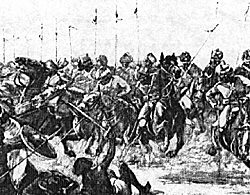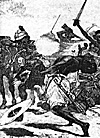 Bugles in the Sudan was developed by Dingwall Wargames Club to play large multi-player games with new comers and old hands alike. They were also meant to be taken away and used by gamers to play solo at home, if they wished. Bearing this in mind a large game could involve a Anglo-Egyptian army of several brigades operating independantly or as a combined force, whilst a smaller solo game might see a solitary brigade taking on the Dervish masses.
Bugles in the Sudan was developed by Dingwall Wargames Club to play large multi-player games with new comers and old hands alike. They were also meant to be taken away and used by gamers to play solo at home, if they wished. Bearing this in mind a large game could involve a Anglo-Egyptian army of several brigades operating independantly or as a combined force, whilst a smaller solo game might see a solitary brigade taking on the Dervish masses.
An excellent mini-campaign for use with Bugles...is the Suakim Field Force 1884, which attempted to relieve Tokar in 1884, and involving desperate battles against the fuzzy wuzzies at El Teb and Tamai. The details of these battles will appear in later issues of The Gauntlet.
ARMIES
British generals will typically command brigades of :
3 to 4 battalions of infantry, 1 Maxim M.G. or artillery battery
2 cavalry regiments, 1 or 2 batteries
Note that the Egyptian army contained Sudanese battalions. Thus "Anglo-Egyptian" includes Sudanese.
Mahdist Emirs command 2D5 units.
Throw 1D5 for unit type: 2 = Cavalry, 3 - 5 = Infantry.
Throw 2D5 for the number of elements in each unit.
Include 1 rifle group for a double 2,
2 rifle groups for a double 3 or 4,
& 3 rifle groups for a double 5.
| BASING | ||
|---|---|---|
| Regular Infantry | 4 figures | 40 x 20mm |
| Mahdist Infantry | 6 figures | 40 x 40mm |
| Mahdist Rifles | 4 figures | 40 x 40mm |
Regular Mounted | 3 figures | 40 x 30mm |
| Mahdist Cavalry | 2 figures | 40 x 40mm |
| Artillery | 1 gun & crew | 40 x 40mm |
| Dismounted Reg. Cav. | 4 figures & horseholder | 40 x 40mm |
SCENARIOS
 For ordinary battles allow 2 Mahdist Emirs per British general. It may be preferable to set the British a scenario objective, e.g. reach a waterhole by dusk, relieve an outpost etc.
For ordinary battles allow 2 Mahdist Emirs per British general. It may be preferable to set the British a scenario objective, e.g. reach a waterhole by dusk, relieve an outpost etc.
For this type of scenario or in solo games, the Mahdists can be randomly generated
each turn, during the 'Generals' phase, place a Mahdist marker at a random entry pointon the table edge. Count the number of combat groups/elements in the Anglo-Egyptian force at the start of the game. This creates the basic percentage chance of the marker being the force of a Mahdist Emir, whose size and type are decided by dice throw. Otherwise it becomes a false marker (see Hidden Movement) representing troops in cover (these being placed at the start of the game if required). If a unit is discovered it`s placed on the table with "Attack" orders.
TACTICS
British troops are well-nigh impervious to frontal assault. The basic regular tactic is to deploy into a firing line and pound away. Cavalry should be used to scout out areas of dead ground or cover to flush out concealed Mahdist units. Egyptian and Sudanese troops generally act as British
Mahdists are realistically (?) vulnerable when making frontal attacks. Their best policy seems to be to lurk in cover until the enemy is at close range, or use march moves / dummy markers to create uncertainty amongst the enemy before swooping on isolated units.
The requirement for a 'Hold' order to be placed in order to change formation means that it can be a cumbersome process to go from a movement column to an attack line. If such a formation change is ordered too close to the enemy there is potential for a disaster.
SCALES
1 figure = 40 men
1 model = 1 gun
1" = 80 yards
Turn = 15 minutes
MOVE SEQUENCE
1 Both Commanders move & issue orders
2 Mahdists move and fire
3 Anglo-Egyptians fire
4 Resolve combats
5 British move and fire again, Egyptian/Sudanese move OR fire
6 Resolve new combats
ORDERS
Each unit starts the game with one of the following orders. These must be acted upon & can only be changed by a general issuing new orders. Counters should be placed with each unit to remind players of their current orders.
"HOLD"
Deploy into battle formation & hold present position
i.e. Anglo-Egyptians fire at enemy within range, Mahdists stand & fire or attack enemy who approach within 6". Regular cavalry either dismount and act as infantry or remain mounted and charge enemy within 6".
"ATTACK"
Deploy into battle formation, advance & engage the enemy
The choice of engaging the enemy with fire or melee is left to the player. However, units must attempt to move at least into their own firing range of the enemy. Mahdist units with no rifle elements will always attempt to charge home.
"MOVE"
Move as desired in any formation at any permissable speed
Units who come within 12" of an enemy, or who come under fire automatically have their MOVE order replaced with HOLD. The exception to this is that MOVE orders can be issued to withdraw troops.
CHANGING ORDERS
In phase 1 of each move a general may move then change a mimber of orders for units under his command.To see how many orders he can change, throw 1D5. Mahdists deduct one from each dice, generals who moved deduct one.
For a unit to automatically receive anew order it must be within 8" of a Mahdist general, or 12" of a Anglo-Egyptian one. Units outwith these distances throw 1D6.
- Mahdists require 5 or 6 to obey,
Sudanese-Egyptian regulars 4,5 or 6,
British 3,4,5 or 6.
A general may only attempt to change each units orders once per turn.
MOVEMENT
FORMATIONS
- "BATTLE": Basically line. One rank deep for regulars, two ranks deep for Mahdists
"COLUMN": Single base width for regulars. Any formation over two ranks deep for Mahdists. Includes limbered artillery.
Changing formation tales one move & requires a 'HOLD' order, i.e. a unit cannot go directly from 'MOVE' in column to 'ATTACK' *
About face takes 1/2 move.
* This means changing from column to line to launch an attack in line takes time.
MOVEMENT RATES
All units may move up to the following distances each turn. The exception to this is any unit whose formation has been broken by combat or fire. These units use individual group moves to regain contact with other groups in their formation. Surplus movement allowance can then be used to move the whole formation.
| TYPE | LINE/MANHANDLE | COLUMN | MARCH SPEED* |
|---|---|---|---|
| Regular Inf/Art | 3" | 5" | - |
| Regular Mounted | 4" | 6" | - |
| Mahdist Foot | 4" | 5" | 8" |
| Mahdist Mounted | 5" | 6" | 10" |
| Generals move 8". Mahdist Artillery may not move Retire backwards at 1/2 speed (line only) | |||
* March speed is only available to Mahdists in column formation and who are over 20" away from an enemy. Within this distance it is assumed that sporadic harassing fire or natural caution slows them down.
HIDDEN MOVEMENT
 Mahdist units over 12" from the enemy are represented by markers (cotton wool dust clouds !) and are not revealed until within 12". False markers can be issued at a rate of one per 3 or 4 real units.
Mahdist units over 12" from the enemy are represented by markers (cotton wool dust clouds !) and are not revealed until within 12". False markers can be issued at a rate of one per 3 or 4 real units.
- Units in dead ground or cover remain as markers until enemy approaches within 8".
- Markers can be fired upon and a note of casualties should be kept until the unit is revealed.
Markers under fire move at 3" per move which simulates the re-grouping required by 'visible' units. An optional rule is to place a marker on all areas of cover. This should instil realistic caution in the Anglo-Egyptian regulars.
COMBAT & FIRING
Individual group bases engage enemy bases by firing at any target within 45 degrees or combat with any group in base-to-base contact.
Add a D6 to the appropriate value given below & compare totals. All firers in a unit must state their individual targets before resolving any fire.
| FIRING RANGES | |||||
|---|---|---|---|---|---|
| TROOP TYPE | COMBAT | 0-5" | 5-10" | 10-15" | 15-20" |
| British Infantry | 6 | 6 | 5 | - | - |
| Sudanese | 5 | 5 | 4 | - | - |
| Egyptian | 4 | 4 | 4 | - | - |
| Mahdistlnfantry | 3 | - | - | - | - |
| Mahdist Rifles | 3 | 3 | 2 | - | - |
| Reg. Cavalry | 5 | 4 | - | - | -* |
| MahdistCavalry | 3 | - | - | - | - |
| Maxim M.G. | 6 | 8 | 6 | 4 | - |
| Reg. Artillery | 4 | 4 | 6 | 4 | 2 |
| Mahdist Artilery | 3 | 4 | 4 | 2 | 1 |
* Dismounted cavalry fight as infantry of same nationality
Firing units "attack" enemy combat value irrespective of range
Modifiers:
- Regu1ars in bad going - 1
2nd rank in combat + 1
Overlapped by enemy (each) - 1
Defending zariba/barricade/building + 1 (in combat only)
Firing at troops in cover - 1
MacDonald with Sudanese + 1 (attached to command group)
Results:
Less than enemy score, but over half:-
- Regular Infantry Suppressed by fire, destroyed in combat
Regular Cavalry Recoil from fire, destroyed in combat
Mahdist Infantry Destroyed by cavalry in open, recoil from fire
Mahdist Cavalry Destroyed by cavalry in contact in open, or if in bad going, recoil from fire
Artillery Destroyed in combat, suppressed by fire
Under half enemy total:
- All Destroyed
Recoil: Fall back one base depth, push back any supporting ranks. Any group unable to recoil because of a major tenain obstacle (river, cliff, zariba etc.) or because a separate unit is preventing recoil, is destroyed
Suppressed: Fall back one base depth, backs to enemy Recover & rejoin fomation in next movement phase ny group which added +1 as rear support is destroyed if the group it supported is destroyed (in combat only).
OPTIONAL RULES
DUST STORMS
Throw 2D6 per move - 12 = a storm lasting 2D6 turns with visibility reduced to 2D6 inches. Use markers for Mahdists outwith this range. Only Mahdists can move but at half speed - throw 1D5 per turn :
- 2 = veer 45 degrees left,
5 = 45 degrees right
Units which collide must halt until the storm abates. Once within visual range of the Anglo-Egyptian unit, Mahdist units act as normal.
Back to The Gauntlet No. 12 Table of Contents
Back to The Gauntlet List of Issues
Back to Master Magazine List
© Copyright 1998 by Craig Martelle Publications
This article appears in MagWeb (Magazine Web) on the Internet World Wide Web.
Other military history articles and gaming articles are available at http://www.magweb.com